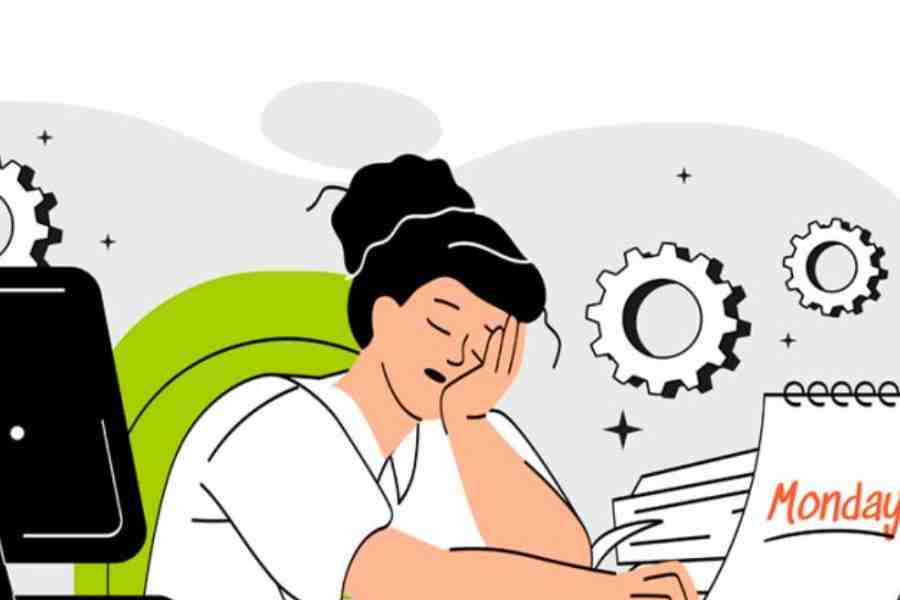Monday blues
Sir — Research has now revealed that the transition from Sunday to Monday can feel like jet lag. While the infamous ‘Monday blues’ is a psychological phenomenon resulting from the anxiety of returning to work and the pressures associated with it, the misalignment of sleep patterns over the weekend worsens its mental burden. Research further links misaligned sleep schedules to depression, anxiety, chronic illness, weight gain, and reduced cognitive performance. Perhaps it is time to ditch the lazy Saturday morning sleep and the slumberous Sunday afternoon snooze to make Mondays great again.
Priyanka Roy, Calcutta
Fatal crash
Sir — The ghastly train crash in Balasore, Odisha, which killed nearly 300 people, is the worst railway accident in two decades (“Deaths without pause”, June 4). The Coromandel Express (from Howrah to Chennai) was mistakenly switched over to the track of a parked goods train, derailing it. The Bengaluru-Howrah Superfast Express then rammed into the derailed coaches of the Coromandel Express. It is unfortunate and worrying that the automatic train protection system, Kavach, which could have prevented this tragedy or, at the very least, reduced its impact is not available along this route.
Railways are the country’s lifeline. Instead of introducing bullet trains and other semi-high speed and premium trains, money should be invested in modernising the railways and ensuring the safety of passengers. It is a shame that even though there exists a system that can prevent such crashes, it is not present all over the country but only on some select routes.
Dhananjay Sinha, Calcutta
Sir — Train accidents are still alarmingly common in India. Although rescue teams from the state and the Central government have been employed in Balasore, this cannot bring back those who lost their lives. A high-level inquiry should be conducted into what went wrong.
Jayanta Datta, Hooghly
Sir — Shocking as they are, mere statistics cannot capture the extent of the damages caused by the train crashes in Odisha. Derailed dreams, shattered lives and upended hopes lie buried under the wreckage.
Roshni Ojha, Howrah
Sir — The incumbent railways minister has no reason to resign. It was Ashwini Vaishnaw’s predecessor, Piyush Goyal, who introduced premium trains and increased ticket prices. The introduction of bullet trains and the Vande Bharat trains is a waste of resources. Moreover, those who are directly responsible for the accident should be asked to resign and then tried for manslaughter.
Shanthi Ramanathan, Ghaziabad
Sir — It is a matter of great shame that government audit documents show that the funds generated for a safety initiative for the railways fell short of the target for four years. Why was this shortfall not flagged by the Comptroller and Auditor General’s office? Yet, no action was taken on it. Whatever the malfunction that led to the train crashes, there is no doubt that the present government’s penchant for all that glitters is what leaves gaps in basic safety protocols. The money lavished on fancy trains and even fancier launch ceremonies could be invested in existing technology that can save hundreds of lives.
Shreya Basu, Calcutta
Health is wealth
Sir — Medical colleges are mushrooming in the country. But the lack of trained faculty and poor facilities in these colleges are reasons for concern (“Concern over quantity of medical education”, June 1). Yet, the West Bengal government is contemplating a diploma course in medicine. Substandard medical professionals will do more harm than good.
Basudeb Dutta, Nadia
Sir — The idea of alternative medicine is a curious one (“Led astray”, June 2). There are only three kinds of medicine: medicine that is proven to work, medicine that is proven not to work, and medicine that has not been conclusively studied. It is interesting to note that our netas do not opt for alternative medicine during an emergency even though they proclaim its virtues. Patients deserve better than to be treated with cures that are not supported by clear, science-based evidence.
H.N. Ramakrishna, Bengaluru
Deep ties
Sir — The BRICS foreign ministers’ meeting in Cape Town on June 1 was significant for several reasons. This was the first time that the BRICS countries met since the start of the Ukraine war, allowing participants to discuss the fallouts of the war. The meeting also considered expanding the BRICS membership. This is a significant development as it would signal the BRICS countries’ commitment to multilateralism and cooperation on development. The upcoming 15th BRICS Summit in Durban in August will be an important opportunity for the members to reaffirm their commitment to these causes.
Amarjeet Kumar, Hazaribag, Jharkhand










